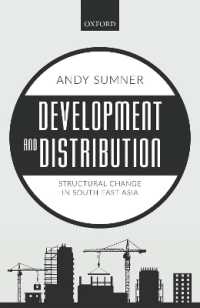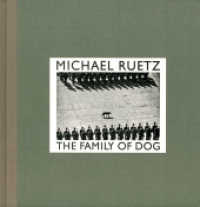- ホーム
- > 洋書
- > 英文書
- > Politics / International Relations
Full Description
Despite the consensus that economic diplomacy played a crucial role in ending the Cold War, very little research has been done on the economic diplomacy during the crucial decades of the 1970s and 1980s. This book fills the gap by exploring the complex interweaving of East-West political and economic diplomacies in the pursuit of détente. The focus on German chancellor Willy Brandt's Ostpolitik reveals how its success was rooted in the usage of energy trade and high tech exchanges with the Soviet Union. His policies and visions are contrasted with those of U.S. President Richard Nixon and the Realpolitik of Henry Kissinger. The ultimate failure to coordinate these rivaling détente policies, and the resulting divide on how to deal with the Soviet Union, left NATO with an energy dilemma between American and European partners—one that has resurfaced in the 21st century with Russia's politicization of energy trade. This book is essential for anyone interested in exploring the interface of international diplomacy, economic interest, and alliance cohesion.
Contents
Prelude
Chapter 1. Détente, Trade, and the Alliance in the 1960s.
Pro-American Ostpolitik - nothing but East-West trade
Kennedy's Use of East-West trade as a Political Tool
The Busted Pipeline Deal of 1962
Johnson's Ambivalence to East-West trade
Brandt's Ostpolitik is forming
Chapter 2. Of Honeymoons and Idealism (1968-1970)
Nixon's Vision of a Responsible Europe
Exploring Osthandel in 1968/9
Domestic and International Dissent to a new Osthandel
Nixon's concepts on East-West trade
Initial Ostpolitik: Brandt's Honeymoon Period
The first Gas-Pipeline Deal
The Inter-German Summit Meeting: The Rude Awakening
The German-American Summit on >Ostpolitik in April 1970
Eastern Dilemmas with Détente
Chapter 3. Westhandel and the Alliance (1970-1972)
The Need for Soviet Westhandel
Western Imports: The Kama River Plant
Soviet Exports: Energy Resources
The German Paradigm Shift of the Soviet Union towards a "Normal" State
Using Westhandel as a Wedge in NATO
Clashes within the Alliance over East-West Trade
West Berlin, Trade, and the Eastern Treaties
An Independent West-German Diplomacy?
Chapter 4. The Origins of NATO's Energy Dilemma (1972-1974)
Superpower Détente
Systemic Shifts in the Soviet Union
Ostpolitik in the Crossfire
The Brezhnev Summits in Germany and the U.S.
Cementing Superpower Detente and the Middle East Crisis
The Transatlantic Rift Emerges
Reviving West European-Soviet Trade
Chapter 5. Helsinki and the Fall of Détente (1975-1982)
The Blessing and the Curse
West Germany as the Villain
Ford's Lack of Direction
Jimmy Carter's Human Rights Campaign
Afghanistan Crisis and Carter's Embargo
Reagan's Push for Alliance Solidarity
Conclusion: A Permanent Energy Dilemma for the West?
Bibliography
Notes








